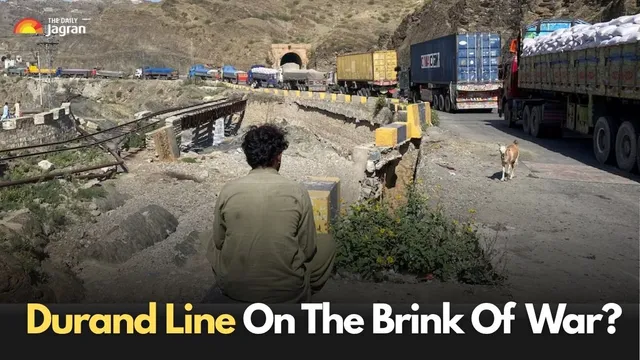- By Supratik Das
- Sun, 12 Oct 2025 04:56 PM (IST)
- Source:JND
Pakistan-Afghanistan border clash: In one of the most serious military escalations in recent years, Afghanistan on Sunday claimed that its forces killed 58 Pakistani soldiers and captured 25 military outposts during intense overnight fighting along the Durand Line, the disputed border that divides the two neighbours. The Taliban government said the move was in retaliation for what it described as repeated “violations of Afghan territory and airspace” by Pakistan.
Afghanistan’s chief spokesman, Zabihullah Mujahid, said Taliban forces launched coordinated operations across several border provinces, including Kunar and Helmand, resulting in heavy Pakistani losses. “Our forces successfully targeted multiple Pakistani posts. Fifty-eight soldiers were killed, 30 others wounded, and several posts are now under our control,” Mujahid told reporters in Kabul.
The Durand Line: Why It Matters
The Durand Line, which spans over 2,611 km (1,622 miles), is not just a geographical fault line; it's a symbol of unfulfilled history, identity, and sovereignty. Here's why it remains one of South Asia's hottest flashpoints:
• Colonial Heritage: It was established in 1893 on the boundary between British India and Afghanistan in an agreement between Amir Abdur Rahman Khan and Sir Mortimer Durand. Afghanistan contends that it was signed under compulsion.
• Ethnic Divide: It divided Pashtun and Baloch tribes, separating families and ethnic groups across Pakistan and Afghanistan, a wound that continues to sustain pain.
• Non-Recognition: Afghanistan remains the sole nation that has never officially accepted the Durand Line as an international frontier.
• Security Concerns: The open border facilitates militants and smugglers to cross back and forth, presenting perennial security headaches for both countries.
• Economic Impact: On and off closures of the border hinder commerce and livelihood activities of those people who live on cross-border movement.
• Icon of Mistrust: To Pakistan, it is an emblem of sovereignty; to Afghanistan, a symbol of historical injustice and lost ground.
After the confrontations, both sides closed major crossings, such as Torkham and Chaman, freezing cross-border trade and passenger traffic. Smaller roads at Kharlachi, Angoor Adda, and Ghulam Khan were shut down. Authorities stated hundreds of trucks carrying cargo were stuck on each side, with tensions failing to ease.
Prime Minister Shehbaz Sharif warned Kabul against “provocations” and vowed to defend Pakistan’s territorial integrity. “There will be no compromise on Pakistan’s defence. Every act of aggression will be met with a strong and effective response,” he said in a statement.
ALSO READ: Pakistan Closes Borders, Vows Strong Response After Deadly Afghanistan ‘Provocation’
Sharif also commended the Pakistan Army’s professionalism under the command of Field Marshal Syed Asim Munir, asserting that multiple Afghan positions had been destroyed in the counter-strikes. Defence Minister Khawaja Asif also told Parliament that Pakistan would not tolerate cross-border terrorism, adding that previous diplomatic appeals to the Taliban had “fallen on deaf ears.” Thus, the latest violence underscores that the Durand Line isn’t just a fence; it’s a fault line of history, identity, and politics

